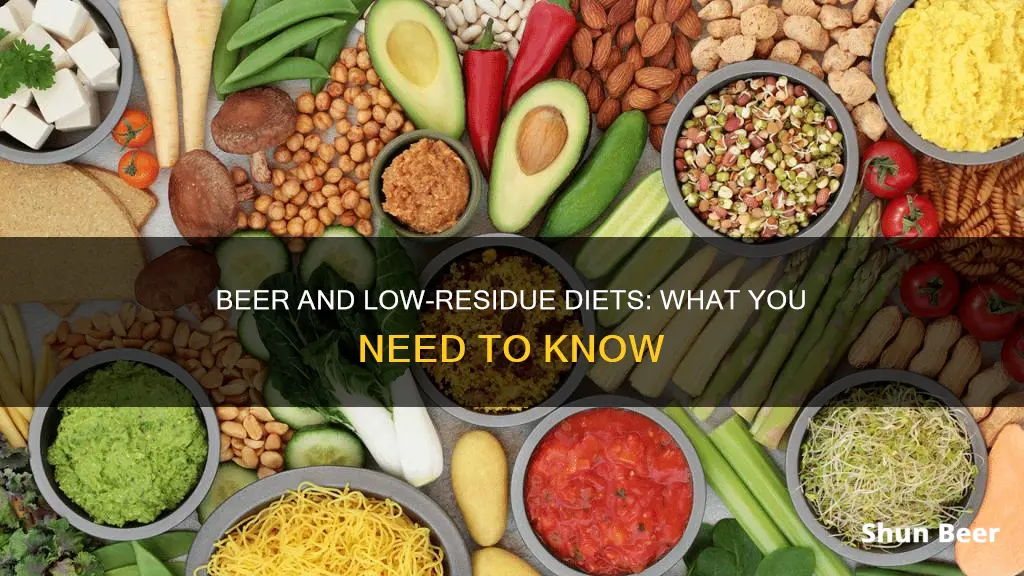
A low-residue diet is often recommended by healthcare providers to reduce stool output and allow the digestive system to rest. It involves limiting foods that leave undigested parts in the colon, such as raw fruits and vegetables, whole grains, nuts, seeds, and beans. Alcoholic beverages, including beer, are not allowed on a low-residue diet. This is because they can irritate the stomach and intestines and hinder the healing process. Therefore, it is essential to avoid beer and other alcoholic drinks while following a low-residue diet.
| Characteristics | Values |
|---|---|
| Alcohol | Not allowed |
| Caffeine | Allowed, but limited to 1 cup per day |
What You'll Learn
- A low-residue diet is recommended for those recovering from bowel surgery or preparing for a colonoscopy
- It reduces foods that leave undigested parts in the colon, such as raw fruits and vegetables, whole grains, and nuts
- Foods to avoid include fried foods, fatty meats, dairy products, and spicy dishes
- Alcoholic beverages are not allowed on a low-residue diet
- The diet is meant to minimize bulk in the intestines and reduce stool output

A low-residue diet is recommended for those recovering from bowel surgery or preparing for a colonoscopy
A low-residue diet is often recommended for those recovering from bowel surgery or preparing for a colonoscopy. Bowel surgery, such as a colectomy, involves the removal of a blocked or diseased part of the large intestine. As the large intestine heals, it's important to follow a diet that will not irritate it or make side effects from surgery worse.
A low-residue diet restricts fibrous foods that are hard to digest. "Residue" refers to the material left in the digestive tract after the initial stages of digestion, which can lead to diarrhea, bloating, gas, and stomach cramps. The diet aims to reduce the frequency and size of bowel movements, thereby reducing these symptoms and lowering the chance of intestinal obstruction.
For those recovering from bowel surgery, a low-residue diet can help the intestines heal by reducing irritation and making food easier to digest. It is recommended to follow this diet for 4 to 6 weeks after surgery. During this time, it is best to avoid high-fiber foods like whole-grain bread and cereals, as well as raw or uncooked fruits and vegetables, which can be crunchy, stringy, or have tough skins or seeds that are hard to digest. Instead, opt for soft, cooked foods like cooked vegetables, bananas, avocados, mashed potatoes, and tender proteins.
For those preparing for a colonoscopy, a low-residue diet can make the prep easier and help tolerate the procedure better. It is recommended to follow this diet for up to a week before the procedure. During this time, it is best to avoid raw fruits and vegetables, whole grains, nuts and seeds, beans, and dairy products, as these can leave undigested parts in the colon. Instead, opt for refined grain products, juices without pulp or seeds, meats, fish, eggs, oils, butter, and fruit without peels or seeds.
It is important to note that a low-residue diet may not provide all the necessary nutrients and can lead to deficiencies if followed for too long. It is typically recommended as a short-term solution and should be done under the guidance of a healthcare professional.
Alcohol-Free Beer and Metronidazole: Is It Safe?
You may want to see also

It reduces foods that leave undigested parts in the colon, such as raw fruits and vegetables, whole grains, and nuts
A low-residue diet reduces foods that leave undigested parts in the colon, such as raw fruits and vegetables, whole grains, and nuts. This type of diet is often recommended by healthcare providers for several reasons, such as healing gastrointestinal conditions, preparing for a colonoscopy, or managing digestive disorders.
Raw fruits and vegetables are included in a low-residue diet because their high fiber content can leave behind undigested plant particles in the colon. While fiber is beneficial for digestive health, it can also contribute to bulkier stools and increased bowel movements. By reducing the intake of raw fruits and vegetables, the amount of undigested residue in the colon decreases, allowing for a more relaxed digestive system.
Whole grains are another food group that leaves undigested parts in the colon. Grains, such as wheat, rye, and barley, contain fiber and other nutrients that can be challenging for the body to fully break down. By limiting the consumption of whole grains, a low-residue diet aims to reduce the workload on the digestive system and promote healing.
Nuts are also known to leave undigested parts in the colon. They contain fiber, healthy fats, and other nutrients, but their tough texture can make them difficult to digest. On a low-residue diet, nuts are typically avoided or limited to smooth nut butter varieties.
It is important to note that a low-residue diet should only be followed under the guidance of a healthcare professional. While it can be beneficial for specific medical conditions, it may not be suitable for everyone and can lead to nutritional deficiencies if not properly managed. Additionally, the definition of "residue" and the specific foods to limit can vary, so it is essential to work with a healthcare provider and registered dietitian to create a safe and effective meal plan.
The Magic of Beer Bread: How Does It Work?
You may want to see also

Foods to avoid include fried foods, fatty meats, dairy products, and spicy dishes
A low-residue diet is often recommended to help heal a gastrointestinal condition or as preparation for a colonoscopy. It involves reducing foods that leave undigested parts in the colon, such as raw fruits and vegetables, nuts, seeds, beans, and whole grains. This diet limits high-fibre foods to reduce stool output and allow the digestive system, especially the large intestine, to rest.
Fried foods are typically high in calories and trans fats, which can negatively affect your health. When foods are fried, they lose water and absorb fat, increasing their calorie content. Fried foods are usually coated in batter or flour before frying, further adding to the calorie count. For example, a baked potato contains 90-128 calories, while the same quantity of potato as French fries contains 320-431 calories. Fried foods are also often cooked in processed vegetable or seed oils, which may contain trans fats that increase when heated to high temperatures. Trans fats are associated with an increased risk of heart disease, cancer, diabetes, and obesity.
Fatty meats should also be avoided on a low-residue diet. Meats should be well-cooked and lean, without gristle, and cooked until tender. Fatty meats can be difficult to digest and may increase the risk of negative health outcomes, such as heart disease and obesity.
Dairy products are another food group to limit on a low-residue diet. Dairy can leave residue in the colon, and those following the diet should limit milk products to no more than two cups per day.
Spicy dishes are not recommended as they can irritate the intestines. It is best to avoid heavy spices and seasonings when following a low-residue diet.
Beer's Power: Removing Trapped Gas, Always
You may want to see also

Alcoholic beverages are not allowed on a low-residue diet
Alcoholic drinks can irritate the stomach and intestines and should be avoided on a low-residue diet. This includes wine, beer, and cocktails. It is important to note that caffeine should also be limited to 1 cup per day as it can have similar irritating effects. Decaffeinated coffee, tea, and soda are permitted, but it is best to check the labels.
Carbonated beverages like seltzer are allowed, although they may increase gas symptoms. Water should be drunk plentifully.
The low-residue diet is often recommended for those recovering from bowel surgery, preparing for a colonoscopy, or experiencing gastrointestinal issues. It is important to work with a healthcare provider and a registered dietitian to ensure proper nutrition and address individual needs and preferences.
Beer and Bulking: Friend or Foe?
You may want to see also

The diet is meant to minimize bulk in the intestines and reduce stool output
A low-residue diet is designed to reduce stool output and minimise intestinal bulk. It does this by limiting foods that leave undigested parts in the colon, such as raw fruits and vegetables, nuts, seeds, beans, and whole grains. These foods are high in fibre, which can leave plant particles in the colon that cannot be digested. By reducing the amount of fibre in the diet, the intestines don't have to work as hard, and there is less waste to be eliminated through bowel movements. This can be particularly beneficial for those recovering from bowel surgery, preparing for a colonoscopy, or experiencing gastrointestinal issues.
The diet is typically recommended by healthcare professionals for specific medical reasons and should be followed under their guidance. It is not a long-term solution and can be challenging to navigate, especially for those with other dietary restrictions. The goal of a low-residue diet is to reduce the workload on the digestive system and allow it to rest.
To achieve this, the diet focuses on soft, easily digestible foods. Meat, for example, should be tender and lean, cooked using methods such as baking, broiling, or roasting. Fish and seafood are also allowed. Tofu is permitted, but soy tempeh is not. Vegetables should be cooked until soft, and raw vegetables, with the exception of lettuce, are generally avoided. Fruits should be peeled and cooked, and berries are not recommended due to their small seeds.
In terms of grains, plain options without seeds, nuts, or raisins are best. White rice, pasta, noodles, and potatoes without the skin are suitable. Bread should be made with refined carbohydrates, and whole grains like oats, rye, and barley are not recommended. Dairy should be limited to two servings per day, and lactose-free options may be preferable for some.
Beverages on a low-residue diet are restricted to fruit juice without pulp (except prune juice) and limited caffeine. Alcoholic beverages, including beer, are not allowed. This is because alcohol can irritate the stomach and intestines and is contrary to the goal of reducing intestinal bulk and stool output.
Beer After Work: Relax, Unwind, and Socialize
You may want to see also
Frequently asked questions
No, you should not drink beer on a low-residue diet. Alcoholic beverages are not allowed on this diet.
A low-residue diet reduces foods that leave undigested parts in the colon, such as raw fruits and vegetables, nuts and seeds, beans, whole grains, and more. It limits foods that are especially high in fibre to reduce stool output.
You can eat meat, fish, tofu, white bread, pancakes, pasta, rice, potatoes without skin, creamy peanut butter, and well-cooked vegetables. You can drink fruit juice, water, carbonated beverages, coffee, tea, and soda, but limit caffeine to 1 cup per day.
A healthcare provider may recommend a low-residue diet for several reasons, such as healing a gastrointestinal condition, preparing for a colonoscopy, or recovering from bowel surgery.







